Russia-drafted new constitution for Syria promises Kurds greater autonomy
A draft version of proposed new constitution for Syria drawn up by Russia would grant Kurds greater administrative freedoms within a more decentralised government, according to an outline presented at recent peace talks.
The preliminary version of the suggested constitution would set limits on presidential terms and curb religion's influence on legislation, according to an Arabic-language copy of the draft obtained by Kurdish news outlet Rudaw.
"The Arabic and Kurdish languages are equals in Kurdish areas of cultural autonomy," the draft says, adding that in other regions have the right to approve the use of languages spoken by a majority of residents.
"The name 'The Syrian Arab Republic' will be dropped and replaced by the name 'The Syrian Republic'," it adds.
The draft suggests that the principle of "decentralised authorities" be applied and that greater powers should be granted to local administrations.
Russia has become the major powerbroker in Syria after changing the tide on the ground with its military support for leader Bashar al-Assad.
Russia's new constitution would confine presidential terms to a single seven-year period in office and no longer only allow Muslims to hold the top post.
"Islamic jurisprudence is no longer a source of legislation," the proposed draft adds.
Rebel negotiators have told The New Arab that they had refused to discuss the draft constitution with Moscow during the recent peace talks in the Kazakh capital Astana sponsored by Russia, Iran and Turkey.
"The opposition delegation that attended the talks went there to secure a total ceasefire in Syria with the exception of land under the control of the Islamic State group," Abdel Hakim Rahmoun, Jaish al-Nasr's representative at the talks, said.
Mustafa Maarati, another rebel delegate, stressed that no foreign power had the right to impose a constitution on Syrians, adding: "A constitution will be written that is approved by the Syrian people when the right conditions are in place."
Two days of indirect talks between rebels and regime representatives ended on Tuesday with no sign of a breakthrough towards a broader political settlement to end the war.
After the talks, sponsors Russia, Iran and Turkey said they had agreed to bolster Syria's frail ceasefire by implementing a "trilateral mechanism".
Coming up with a new constitution for post-conflict Syria is seen as a major hurdle for any talks to end the bloodshed that has cost more than 310,000 lives since protests against Assad erupted into conflict in 2011.
Russia and the United State had pushed for the two sides to come up with a new constitution for the war-torn country by August 2016 during previous unsuccessful talks.
A constitution adopted in 2012 left President Bashar al-Assad with sweeping powers, including the right to name the premier and government and, in some cases, veto legislation.



